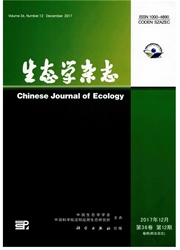

 中文摘要:
中文摘要:
以乡土树种小青杨(Populus pseudo—simonii Kitag)和速生品种欧美杨107杨(Populus×euramericana cv.“74/76”)幼苗为试验材料,在水分胁迫条件下研究不同浓度的外源NO供体硝普纳(sodium nitroprusside,SNP)对2种杨树抗旱性的影响。结果表明,经不同浓度SNP处理后,2种杨树叶片水势对干旱胁迫的敏感程度下降,气孔导度降低,蒸腾作用减弱,叶片含水量升高,保水能力增强。同时,SNP处理能提高杨树叶片可溶性糖和可溶性蛋白含量,降低杨树叶片相对电导率,使杨树在干旱条件下的抗脱水能力提高,减轻了干旱胁迫对细胞膜的伤害。从品种间作用效果看,SNP对107杨的抗旱性提高的幅度高于小青杨,表明SNP更有利于提高速生杨的抗旱能力。
 英文摘要:
英文摘要:
Taking the seedlings of Populus pseudo-simonii Kitag and Populus x euramericana cv. "74/76"as test materials, this paper studied the effects of nitric oxide (NO) donor, sodium nitroprusside (SNP), on their drought-resistance under drought stress. The results indicated that after treated with SNP, the sensitivity of leaf water potential to drought stress, stomatal conductance, and transpiration rate of the two poplar seedlings decreased, while the relative water content and water retention ability of their leaves increased. The contents of soluble sugar and soluble protein in poplar leaves also increased. All of these indicated that SNP could decrease the relative conductance of leaves, increase the drought-resistance of poplars, and alleviate the effects of drought stress. Furthermore, SNP might confer more increased tolerance to P. x euramericana cv. "74/76" than to P. pseudo-simonii, suggesting that this NO donor might be better for drought-sensitive poplar.
 同期刊论文项目
同期刊论文项目
 同项目期刊论文
同项目期刊论文
 Effects of Elevated Ozone on Photosynthetic CO2 Exchange
and Chlorophyll a Fluorescence in Leaves of
Effects of Elevated Ozone on Photosynthetic CO2 Exchange
and Chlorophyll a Fluorescence in Leaves of Influence of elevated carbon dioxide and ozone on the foliar nonvolatile terpenoids in Ginkgo biloba
Influence of elevated carbon dioxide and ozone on the foliar nonvolatile terpenoids in Ginkgo biloba Solar activity, Global Surface Air Temperature Anomaly and Pacific Decadal Oscillation signals obser
Solar activity, Global Surface Air Temperature Anomaly and Pacific Decadal Oscillation signals obser Impact of Elevated CO2 and O3 Concentrations on Biogenic
Volatile Organic Compounds Emissions from G
Impact of Elevated CO2 and O3 Concentrations on Biogenic
Volatile Organic Compounds Emissions from G 期刊信息
期刊信息
